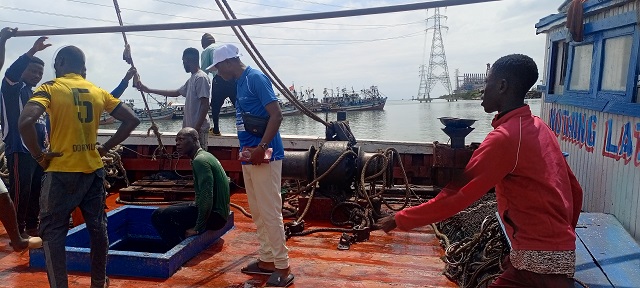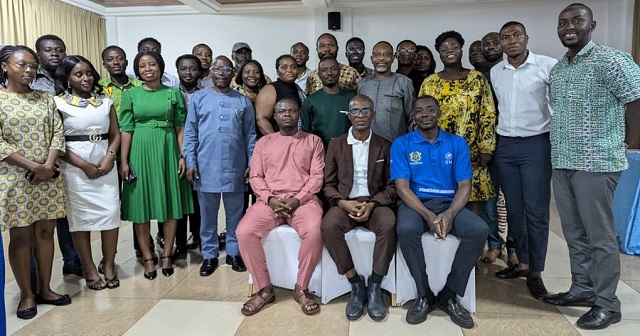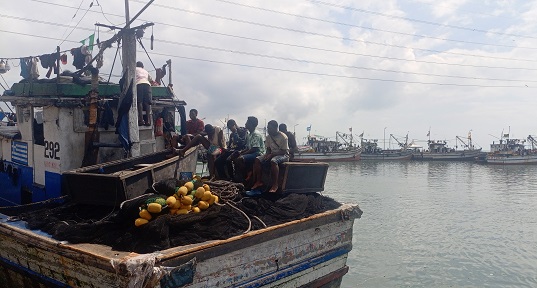A recent fact-finding trip to the Albert Bosomtwi-Sam Fishing Harbour in Takoradi, in the Western Region of Ghana by journalists convened by the International Labour Organization (ILO) has exposed alarming working conditions within the nation’s fishing sector.
The visit was part of a capacity building workshop to empower media actors to lead advocacy on the promotion of safe and decent work in fishing, following Ghana’s ratification of the ILO’s Convention 188 barely two months ago.
The team uncovered systemic labour problems across the fishing industry, including the non-adherence to basic principles that seek to protect workers at sea.
Fishers who interacted with the media narrated several labour lapses relating to their work at sea, including the non-provision of proper facilities to cushion them from harsh weather conditions, improper feeding and other hazardous working conditions.
“Our working condition is very bad. We don’t have mattresses so we have to sleep on the wooden floor and wake up with body pains. Our feeding is very poor, unless we have money to buy our own food for the trip; the boat owner only provides ‘gari’ to the crew,” David Otu-Mensah, who travelled from Winneba to work in the harbour, told Maritimelivegh.com.
He added: “Anyone who says we’re being treated well on the boats is not being honest and not considering his health too. As we’re working today, we have to be mindful of our health in the future.”

David’s revelations, similar to those shared by several others at the site, were in sharp contrast to provisions in the now-ratified ILO Convention C188 which seeks to combat poor working conditions and exploitation in the global fishing industry, where many are vulnerable to abuse and hazardous work.
The ILO Work in Fishing Convention, 2007 (C188) prescribes the need for clear work agreements, decent wages and proper medical care for fishers at sea. It also sets standards for accommodation and food for those living on fishing vessels, as well as social security protection, including medical care and financial support.
Labour mishaps in Ghana’s fishing sector are largely fueled by the absence of formal working agreements between workers and boat owners—and in most cases the ‘bosco’ or ‘goro man’ who mobilizes people to work on the boats.
“We don’t have any contract with the boat owner regarding salaries—and other conditions of work. We only share the catch from every fishing expedition with them, but with no binding agreements,” another fisher, James Baine, who is a crew member on one of the boats disclosed.
Asked what happens peradventure that an expedition does not record any harvest or catch, he shared: “That’s very frustrating for us because we only burn fuel to go and come back empty-handed after spending long hours at sea.”
Media training program on the ILO Convention 188

The four-day media training program on the theme “Building the capacity of media practitioners to strengthen advocacy on decent work and labour rights towards implementation of ILO Work in Fishing Convention (C188) empowered journalists to create awareness about labour abuses in Ghana’s fishing industry, with the country having ratified the convention.
About 30 media practitioners belonging to selected networks such as SOMPAC, Citizen Journalists Network, Media Network on Forced Labour and Fair Recruitment, and Ghana Broadcasting Corporation (GBC), and drawn from the coastal regions of Greater Accra, Western, Central and Volta as well as members from academia took part in the week-long training program.
A facilitator and lecturer from the department of communication of the University of Media, Arts and Communication (UniMAC), Dr. Daniel Odoom, tasked participants to lead advocacy towards the effective enforcement of the ILO Convention 188 through stronger partnerships between public and private media institutions.
On his part, the national project coordinator for the ILO’s SDG8.7 Accelerator Lab Project, Emmanuel Kwame Mensah, urged both state authorities and fisheries stakeholders, including the media to prioritize the safety, health and dignity of fisher-folks in the country, recognizing their crucial contribution to the economy.
“The ratification of the ILO Work in Fishing Convention, C188, means that fishers in Ghana can rely on an accountable framework that requires duty bearers—especially the media, to lead advocacy efforts that will promote compliance to critical labour rights,” he said.
According to him, the media has to play its crucial role in ensuring the success of the C188 through advocacy actions that will educate fishermen to understand their rights as enshrined in the convention, and begin to demand formal contracts to secure their health and working conditions.
